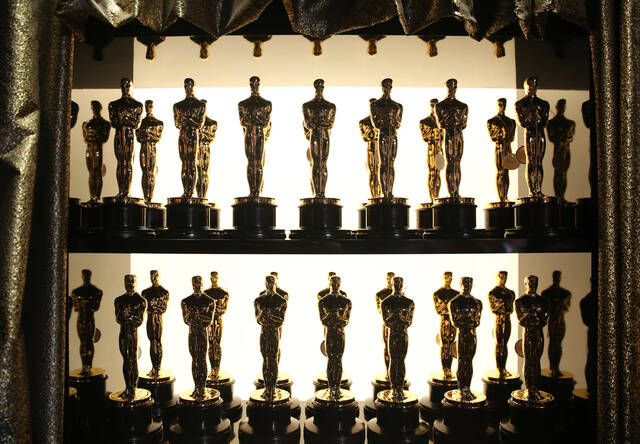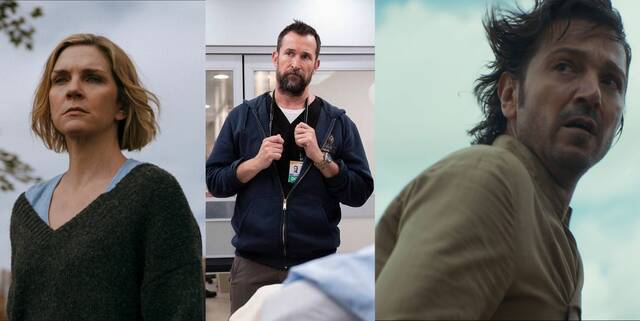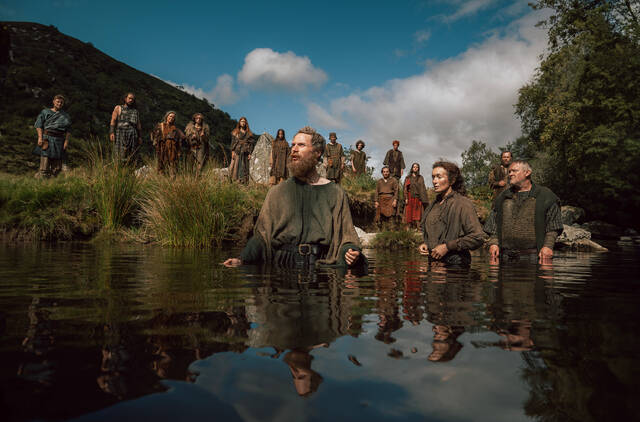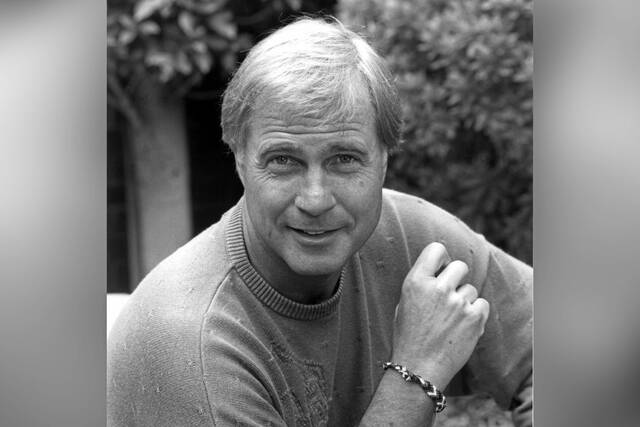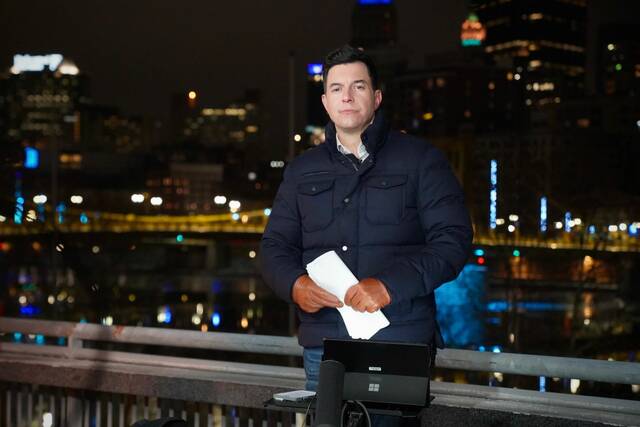WQED Multimedia eliminated five positions on April 29 amid a wave of staff dissatisfaction and concern about the future of the station’s local TV programming.
Four of the employees exited immediately while one, IT director Mike Kobulnicky, was “invited” to stay on through June as the station outsources IT and network support, per an email to staff from WQED president and CEO Jason Jedlinski obtained by TribLive.
That makes at least nine eliminated roles in recent months. Most of the involuntarily departed were older employees, station veterans often with decades of experience. They include multiple regional Emmy-winning design director Paula Zetter and senior promotions and social media producer Dave Hallewell, one-half of the station’s “Dave and Dave’s Excellent Adventures” that aired as part of “On Q” and as its own spinoff series from 2003-10.
One former employee estimated 125 collective years of service and institutional knowledge have been jettisoned in recent months.
Jedlinski wrote in an email April 29, “Any position eliminations are based on changing business requirements and not a budget deficit, as evidenced by new and open roles.”
WQED.org lists eight open positions.
In an email to staff obtained by TribLive, Jedlinski said the jobs eliminated were part of an effort to “align our organization with WQED’s strategic objectives.”
But what are those objectives and how much do they involve regular old broadcast (aka “linear”) TV?
Jedlinski said the objectives are:
• To better reflect the community’s diversity beyond the board and employees to include “the types of stories we tell,” Jedlinski said in an interview Monday. “It’s basically recognizing that we are not working with one monolithic set of viewers or listeners but rather serving multiple communities of all shapes throughout Southwestern Pennsylvania.”
• To meaningfully engage more neighbors. “And that is, broadly, to be relevant beyond a smile about QED as a brand or as a memory to more people and more of these communities,” Jedlinski said. “It’s about meaningful engagement, whether measured by opt-ins from email addresses or cellphone numbers or YouTube views. It is a direct connection with more than our existing members and the youth we serve through our education programs.”
• To “foster a culture of data-driven experimentation.”
• Planning to independently fund WQED’s local programs and initiatives.
Multiple sources told TribLive that Jedlinski says linear TV is dead, PBS is irrelevant and Fred Rogers is old news. Jedlinski denied he used those exact words but acknowledged the sentiment.
“Is the audience on linear television declining at a macro level not only for PBS and stations like WQED? Sure, there are fewer people objectively watching linear television, that’s a far cry from dead,” Jedlinski said. “I have also been talking about Fred Rogers, about his legacy and the way he embraced technology to bring social and emotional learning — before we even had that phrase — to new audiences and to children in different platforms and methods.”
WQED’s lack of promotion — no press releases for multiple original local programs or PBS shows with local ties, including one national co-production, or the station’s 70th anniversary last month — marks a drastic departure from the station’s past efforts to promote its local TV output.
The station axed the communications role of longtime media relations veteran Jody Doherty, which seems to buttress the station’s pullback from promoting its linear TV offerings. (Doherty is expected to assume a new role at the station.)
In January, when speaking of plans to move WQED out of its longtime Oakland home, Jedlinski said he intended to maintain studio space in its new digs. Now sources tell TribLive Jedlinski says the station will not have a studio. Instead, it may rent studio space as needed. From where is unclear.
“Our stage space is limited in the region,” acknowledged Pittsburgh Film Office director Dawn Keezer, saying available space will depend on how many large-scale productions are filming simultaneously. “It’s all a matter of what the production schedule looks like. We hope to be full after a new state budget begins July 1.”
In an interview Monday, Jedlinski said the new locations he’s considering can all be configured to have “production studio” space that will accommodate the production of broadcast television programs, podcasts and more and can also be used for community gathering events of 100 people.
Even before Jedlinski’s arrival, WQED’s TV programming roster was diminished from its 1970s glory years or the renewed output of the early 2000s during the tenure of CEO George Miles and the era of “On Q,” a nightly news magazine program.
Rick Sebak, whose local specials are integral to the WQED brand, made one TV program in the past year, a special on the 50th anniversary of WQED-FM. The station did little to promote it. Sebak’s “Gumbands” podcast wrapped its first season in October. Sebak did not respond to voicemail messages.
Jedlinski said the station is “speaking with some underwriters who have expressed interest” in funding a second season of “Gumbands.” Regarding new Sebak TV programs, Jedlinski said Sebak has “several interviews and projects that he’s working on” but Jedlinski said he had no details to share.
Regarding other programs for broadcast TV, Jedlinski said a previously announced 30-minute profile, “Hope and Healing: The Children’s Institute of Pittsburgh,” will air at 8 p.m. May 16. And beyond that?
“There are other 30- and 60-minute television documentaries in the production pipeline,” Jedlinski said Monday, “none that are to a stage that I can describe them to you today.”
As far as who will make the programs for TV or digital platforms, Jedlinski said some part-time staff had their hours increased. But he’s also keen to get non-professionals involved in storytelling.
“There’s room for helping the community tell their own stories,” Jedlinski said. “We are committed to not only telling stories to audiences but helping and empowering the community to tell their stories. So that is an evolution or will be an evolution of what was brought in from Steeltown Entertainment Project that has more recently been branded WQED Film Academy.”
WQED Film Academy is a youth media training program.
“That’s recognizing that storytelling is a more popular career choice for America’s youth than policemen, firefighters, astronauts or other traditional careers combined,” Jedlinski said.
Indeed, from celebrities to everyday people whose short videos go viral on TikTok, so-called “influencers” have emerged as a viable career choice in the past decade.
“While continuing to invest in and expand our own storytelling capabilities,” Jedlinski said, “we will be working with the community to spotlight stories that have been told either as documentaries, as shorts, as social content, and perhaps commissioning some as well. So we are committed to using our platforms to uplift and promote stories that celebrate our region.”
Every WQED source says there’s been a notable de-emphasis on local TV productions made by WQED staff. Jedlinski said he would not be satisfied if WQED became solely a distributor of PBS programming without local content but acknowledged he is looking beyond traditional TV formats.
“You are correct, there is less of an emphasis on 30- and 60- minute television programming,” he said. “It is one of the most expensive ways to pursue our mission. And there are other programs and initiatives that we continue to test and pilot in our effort to, again, better reflect our community’s diversity and to meaningfully engage more neighbors. It does not mean we are no longer doing [30- and 60-minute documentaries] and it does not mean that they are not valuable.”
WQED’s de-emphasis of TV is out of step with PBS (WQED is a PBS member station).
In an interview at the Television Critics Association winter 2024 press tour in February, PBS president Paula Kerger told TribLive.com that linear TV remains central to PBS’s efforts, even as PBS experiments in the digital space and its series stream on apps like Roku, Prime Video and PBS Passport.
“We still view [linear TV] as a primary platform because there are a lot of people that want a curated experience,” Kerger said. “I do. I come home, flip the TV on, I haven’t thought that hard about what I want to watch and then I may remember the series I’ve been watching that I want to go back and see, so linear is key.”
There’s no doubt that PBS stations need to cultivate new, younger audiences as the traditional audience for PBS stations ages. But it’s a question of how you do it, especially considering the largest group of donors to PBS stations are older viewers still watching PBS via broadcast TV or cable. (PBS’s 2021 Audience Insight annual report shows even 74% of users of PBS Passport — PBS’s streaming service for those who donate $60 or more annually — are age 65 and older.)
One public media source acknowledged that WQED is managing a struggle that exists at more than 300 public television stations across the country.
“TV is not going away tomorrow,” said WQED board chairman Jonathan Rosenson in an interview Monday. “We are continuing to do what we’ve done. We’re talking about evolving for what the community needs long-term.”
WQED, the nation’s first community-supported TV station, has faced upheaval before, including in the early 1990s when money problems and morale were at a low ebb and several rounds of layoffs occurred. Layoffs followed again in 2005, 2009, 2010, 2014 and 2015.
“We lived by the motto, ‘People are donating money to us; we have to be good stewards of their money,’ and I believe in that,” said one former WQED employee. “I’m not out to get anyone fired but I think people should know where their money is going. Our base of support is people over 60. Those people are on limited budgets. It’s tough to see them donating to something they think is happening — local programming, [new] cooking shows — when it’s not. [Jedlinski] wants to phase all that stuff out.”
WQED board chairman Rosenson said that’s not the case.
“We’re not diminishing what they are seeing today,” Rosenson said Monday. “We are evolving to feedback we get that our communities are looking for.”
And what are WQED’s communities looking for? Rosenson deferred to Jedlinski.
“They are looking for stories and experiences that celebrate why we love living in Southwestern Pennsylvania, that has come out in more than 100 conversations with people,” Jedlinski said. “[They want] an unapologetic champion for our region, for the people of our region, for folks who are working to address any number of socioeconomic issues or promote the arts or start a new performing troupe or ensemble. Across the board, [people say,] give us reasons to be hopeful and show us neighbors making a difference. Through television profiles and digital stories are among the ways [to tell those stories] but there are certainly other methods available to answer that need that has been most pronounced, which is, give us that reminder of all that we have in common.”
Jedlinski expressed no concern that donors might curtail giving with fewer original local TV programs.
“Let’s not forget that many of those members — in fact, I dare say, the majority of those members — are very fond of and are fans of PBS programming, whether it be British dramas, whether it be news, or ‘Frontline,’ and those programs are not free,” Jedlinski said. “We pay well over $1 million in license fees to PBS for the rights to those programs. We pay additional money to American Public Television. We pay for the Create channel, the World Channel, etc. Those donations are in very large part going to fund the programming that people know us for and count on us for and regularly tune in for, in addition to the local programming that we have no plans of stopping.”
Read more on the current state of WQED Multimedia in Part 2 this TV Talk column.



